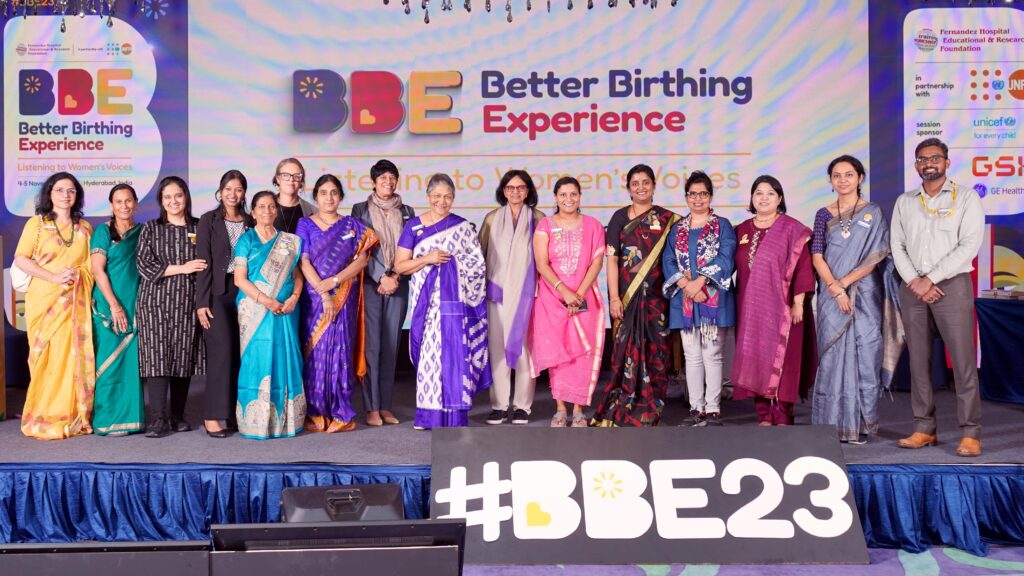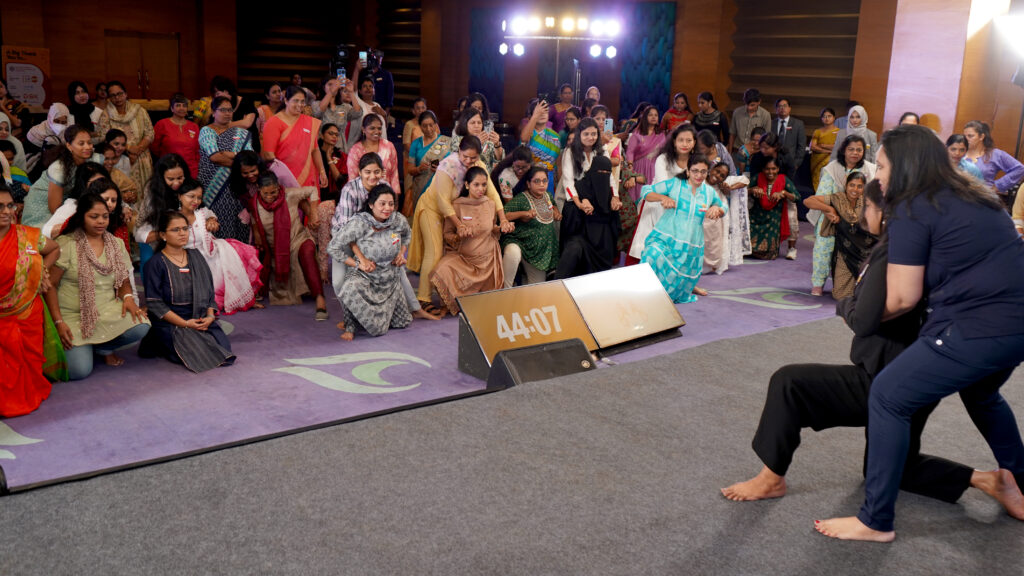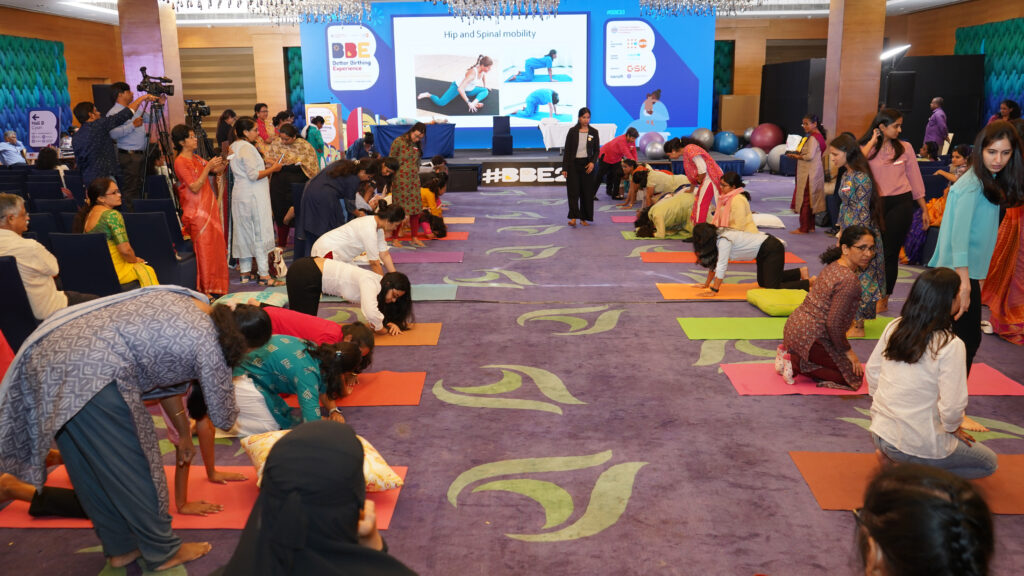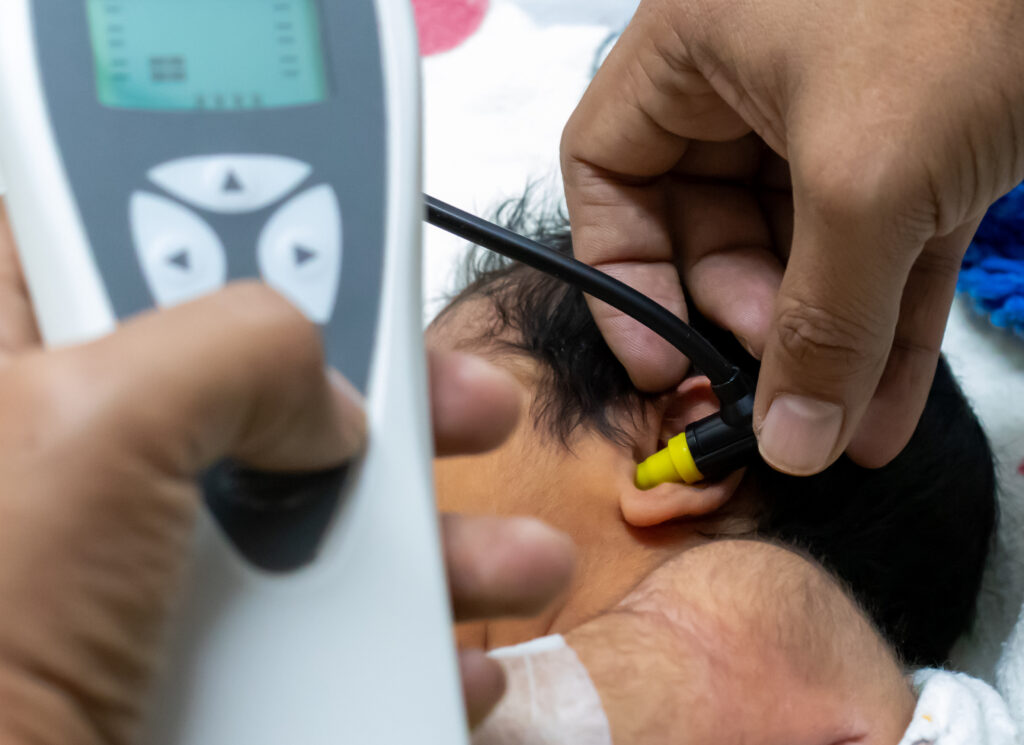Pregnancy, labour, and childbirth are life-changing experiences for a woman and her family. For couples, this is also a time filled with uncertainties, questions, and apprehensions. How do birth professionals make birthing a positive experience for women? How can they remove apprehensions and ensure women are empowered to give birth with confidence?
To answer these questions and equip birth professionals with the latest knowledge about normal undisturbed births, Fernandez Hospital Educational and Research Foundation, in partnership with the United Nations Population Fund (UNFPA), organised the Better Birthing Experience Conference in Hyderabad recently. The conference provided invaluable guidance and support for healthcare providers. The faculty covered a wide variety of topics, from optimal birthing positions and perinatal mental health education to the importance of undisturbed birth and culturally appropriate childbirth education.

In this blog, we will highlight the topics and workshops covered on Day 1 of the conference held on 4 November 2023.
The conference had close to 400 delegates from around 19 states in India and a few other international ones, too. With a mix of professionals, including childbirth educators, obstetricians, midwives, physiotherapists, nurses, doulas, and policymakers, the Better Birthing Experience conference was truly the first of its kind.
Dr Evita Fernandez
Dr Evita Fernandez, the Managing Trustee of the Fernandez Hospital Educational and Research Foundation (FHERF) kickstarted the conference with a powerful introduction on why women all over the world deserve better and positive experiences and, as birth professionals, we owe it to them.
The Beauty of Undisturbed Births
“Undisturbed births are endangered today”, Priyanka Idicula beautifully described what undisturbed births are and how, as healthcare providers, we need to protect the environment in which women birth! Priyanka emphasised the importance of allowing the birthing process to unfold naturally with minimal interventions. Attendees and delegates learned how a calm and supportive environment, combined with respectful care, can enhance the birthing experience, and promote better outcomes for both mother and baby.
After that talk, Priyanka followed it up with a workshop on Birthing Positions. Attendees learned about the advantages of various birthing positions, which can significantly impact the ease and comfort of labour and delivery. Knowledge about these positions empowers parents to make informed choices about their birthing experience.

Gentle Birthing
Dr Gowri Motha, world-renowned obstetrician and pioneer of the Gentle Birthing Method, discussed and advocated for a more serene and compassionate birthing experience. She encouraged birth professionals to learn gentle handling of mothers, positive communication, and comfort measures, helping to create a calm and reassuring atmosphere during labour and delivery.
Hydrotherapy and Water Births
Hydrotherapy and water births are gaining popularity as they offer pain relief, relaxation, and buoyancy during labour. Better Birthing Experience Conferences provided insights into the benefits and techniques of water birth in the workshop “Hydrotherapy and Water Births” by Ms Indie Kaur and Dr Usha Ukande. The knowledge gave healthcare providers a chance to learn and explore how water birth and hydrotherapy work during labour.
Optimal Fetal Positions
The Optimal Fetal Positions workshop was a comprehensive session focused on educating participants about the importance of fetal positioning during pregnancy and labour. Led by Dr Latha Balasundaram, Head, Dept of Physiotherapy, Fernandez Hospital and Ms Sheetal Samson, National Midwifery Educator at NMTI Fernandez, the workshop delved into various techniques and exercises that can help optimise the positioning of the fetus for a smoother birthing process. Attendees gained valuable insights into the impact of maternal positioning on the progression of labour, as well as learned practical strategies to enhance maternal comfort and facilitate an optimal birth experience.

Perinatal Mental Health Education
The perinatal period, encompassing pregnancy and the postpartum period, can be emotionally challenging for many parents. The conference had a detailed workshop on “A framework for prenatal mental health education and screening for obstetricians” by Dr Sai Krishna and Dr Shubangi Dere. The session offered valuable guidance on identifying and addressing issues like prenatal and postpartum depression and anxiety, empowering health providers to prioritise their mental well-being.
Language Matters
Does language matter in a labour room? What role does respect play in maternity care? How does respectful maternity care (RMC) look in reality? The workshop on RMC by the Fernandez team had all the participants thinking about how they treat mothers. During the workshop, the attendees were divided into diverse groups, fostering collaborative discussions, and sharing learning experiences. The team of Fernandez doctors guided each group through a series of engaging sessions aimed at promoting awareness and understanding of the crucial role of language in fostering respectful maternal care. Participants actively delved into the nuances of communication, emphasising the significance of using compassionate and empowering language when interacting with expectant mothers and addressing their healthcare needs. Through various role-play exercises and case studies, attendees developed a heightened sensitivity to the impact of language on maternal well-being, enabling them to cultivate a more empathetic and supportive environment within healthcare settings.
The Power of Hypnobirthing
The workshop on Hypnobirthing facilitated by Dr Pooja Shenoy had practical demonstrations in which participants gained a comprehensive understanding of how hypnobirthing can alleviate fear and anxiety during childbirth, promoting a more relaxed and positive birthing experience. The workshop emphasised the importance of mindfulness, breathing exercises, and deep relaxation techniques in empowering expectant mothers to harness their innate ability to manage pain and facilitate a smoother labour process.
Overall, day one at the Better Birthing Experience Conference had a treasure trove of information and practical workshops to deepen the understanding of health professionals.

